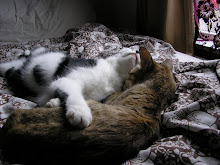Last Wednesday was the Manchester launch of Reporting Poverty in the UK, a guide for journalists based on research carried out by Glasgow Caledonian University.
The research looked at how the British press talks about poverty, and while perhaps not a surprise to someone with my attitude to the ethics of the mainstream press in this country, it did include some depressingly good illustrations of the way that some journalists think.
One illuminating quote from the editor of a national tabloid was along the lines of: "Fuel poverty is not a story. Poor people fiddling their gas meters is a story." So - thousands of people freezing in their homes over the winter isn't interesting, and fuel companies making massive profits off huge price rises isn't interesting, but a tiny and unrepresentative number of poor people finding ways to get round that is a valid subject for prurient, judgemental prying. What a delightful society we are.
A more comforting comment was from an anonymous female tabloid reader, who said something akin to 'I read the News of the World but I don't believe anything in it - not even the TV listings.'
The actual launch event, run by funders the Joseph Rowntree Foundation and the Media Trust, was excellent (and not just because of the really good lunch, much better than the somewhat suspect sarnies usually on offer. And a decent veggie selection).
With a reasonable balance of journalists and people from a wide range of organisations tackling poverty or working in marginalised areas (like Carisma from Home Sweet Home, Moss Side), there were some really active debates about how third sector organisations, especially those with tiny PR resources and budgets, can relate to the media, how they can protect their members and service users when journalists turn up wanting case studies, and how journalists can behave in a slightly more ethical and honourable fashion, respecting people whose life circumstances have put them in poverty.
Discussions raised issues like why the press seems to feel the need to stereotype and insult poor people - is it so that the better-off can deny to themselves that they might be benefiting from an unequal system? And is the kind of understanding and improvement in reporting that the event and report are trying to achieve eroded by developments in the media industry itself, where it seems to be increasingly difficult to get an entry into national-level newspapers and magazine without spending weeks or months doing unpaid internships. And who gets to do those in London, a ludicrously expensive city to work in? Rich, usually white, kids. Increasing yet more the distance between journalists and the people and communities they talk about. So, all the more need for people to take a look at the Media Trust/JRF guide, and try to absorb some of its lessons.
Sunday, November 16, 2008
Subscribe to:
Post Comments (Atom)








No comments:
Post a Comment